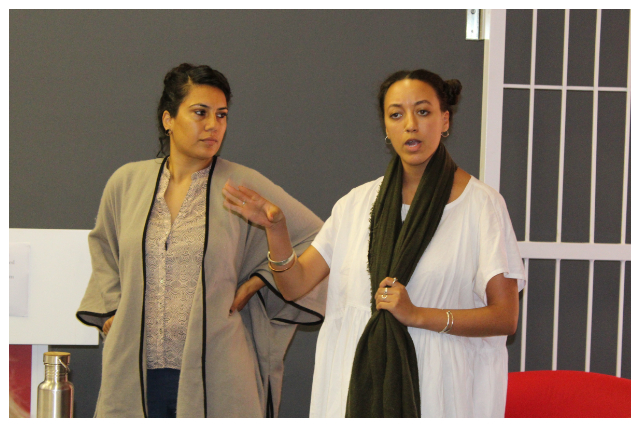The Art for Humanity as part of the Indlela Public Lecture Series hosted an artist talk by Chandra Frank and Zara Julius at the Durban University of Technology (DUT) City campus on 23 May 2018.
The aim of the lecture series is to create discussions and gather information on how narratives are told and lived, how people represented themselves during the 80s era through archiving.
Chandra Frank’s work is focused on the Black, Migrant and Refugee women’s movement in the Netherlands during the 1980s. She explores the role of archives, transnational queer kinship, the making of feminist geology and the politics of pleasure. Chandra has taught on feminism, queerness, and popular culture and given lectures about her work internationally.
She gave more insight into her work and how students can now become involved in her research project on archiving.She spoke of the various projects she had embarked on and of her narrative exhibition which had entailed a two-year project with South African based collaborator District Six Museum. Her works explored themes such as race, gender, memory, trauma and spatiality.
“My dad is an Indian from Chatsworth and my mom is a Dutch from Amsterdam. I grew up in Amsterdam and not in South Africa. My dad left a collection of political books on South Africa and what really interested me was finding out what they meant as well as what politics looked like in the 80s era in Durban, South Africa. This question on archives really got me interested. My field is archiving so I have worked with women from all over world and the global social background they were living in,” she said.
Chandra is committed to developing alternative ways of exhibition making. She encourages DUT students to become involved in the social research and become part in helping gain access to peoples’ personal archives and help in her collection of what people of different colours had been through, especially during Apartheid.
Zara Julius, who is working in partnership with Frank, also gave an overview of her projects.
She is a multidisciplinary visual storyteller and music collector based in Johannesburg, with a background in social anthropology and photography. Her mom is coloured and her dad is white. Her work is concerned with the relationships between aesthetics and culture, African futures, and the varying paradoxes that emerge with the interplay of identity, faith, religion, urbanity, migration, race, and desire in Africa and the African diaspora.
One such project she has worked on is called Mixed Space. It is a dialogue-driven documentary that unpacks the way multiracial or mixed race people navigate their worlds. She started on it a few years ago as a series of focus groups that she was hosting in her apartment when she was living in Cape Town. “I was kind of just inviting three or four people at a time who all identified as first generation mixed race to kind of just have chats about our experiences – to create a sense of mirroring of our experiences and how we navigate even something like our families as an example,” she said.
The idea of the project was to show how flawed the racial categorisation in South Africa really is because, for example, there are people who are half coloured and half white in the project who identify as coloured.
Both women are urging DUT students to meet and chat further on how they can play a role in identifying and documenting people with similar backgrounds and experiences in Durban.
Pictured: Chandra Frank and Zara Julius, at the talk.
Waheeda Peters


